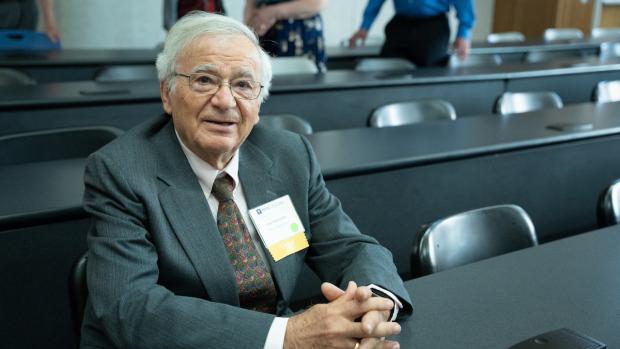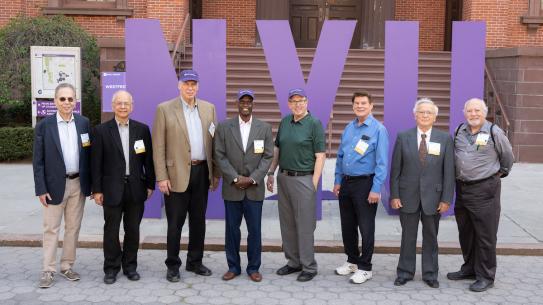From a small Greek village to the Earth’s orbit: an alum’s story

Peter Stavroulakis, Class of 1973
Peter Stavroulakis will never forget listening to the radio while growing up on the Greek island of Crete and hearing John F. Kennedy proclaim that America would land a man on the moon within a decade. Maybe one day he could participate in a space mission, he thought, but that would probably require heading to the U.S.
It was, admittedly, an ambitious idea for a young boy from the tiny village of Episkopi, population then about 800, who knew barely any English.
Stavroulakis was one of only four students in his elementary-school class of 24 to pass an entrance test entitling him to attend the science-focused high school in the city of Rethymno, where he boarded with a local family. “I couldn’t tell you what I had to eat or whether or not the accommodations were adequate,” he says. “I cared nothing about comfort; I wanted only to get a good education.”
After he graduated in 1964, he mailed his diploma (translated by the Foreign Ministry), to his sister, who had by then settled in America, assuming that she could help him start the college application process. She admired the document and then promptly stowed it in a drawer. Finally, as fall approached, an acquaintance suggested she send it to NYU. While she had not thought to include a cover letter, administrators were impressed enough to invite Stavroulakis to fly to New York to take a three-part entrance exam that tested his knowledge of math, physics, and English.
When he passed the math and physics portions of the test with flying colors but flunked the English portion, they still offered him a spot — with the proviso that he spend a semester intensively studying the language. Undaunted, he threw himself into becoming fluent, adjusting to American culture, and learning how the city’s transit system worked. (When a major blackout hit just three months after his arrival he was nonetheless able to navigate from the Bronx back to his sister’s New Jersey home by trial and error.)
By the time Stavroulakis earned his bachelor’s degree, magna cum laude, in electrical engineering in 1969, his English had improved to such an extent that he felt confident enough to approach the dean at the University Heights campus to propose launching a free tutoring service for students from groups underrepresented in the STEM fields, who in the midst of the movement for social and racial justice were then being admitted to the school in greater numbers. “The year the new tutoring service started under my leadership, it helped nine students who had been failing turn their grades around,” he recalls, “and that’s probably one of the proudest moments of my undergraduate years.”
At the time he earned his bachelor’s degree, NYU and Caltech were engaged in a partnership whereby promising students would complete a one-year master’s program on the West Coast before returning to New York to earn doctoral degrees. Ph.D.s were relatively rare in that era, and once Stavroulakis had received his, in 1973, he was offered a post at the now-legendary Bell Labs without even sending in an application, thanks to a visit from a recruiter who had come to NYU seeking doctoral-level grads.
What followed was a career that would be easy to imagine depicted on the silver screen: while he was at Bell, parent company AT&T signed a major contract with the Shah of Iran, who wanted his country to deploy a satellite system. Stavroulakis was put in charge of studying interference signals, and it was a devastating blow to learn near the end of the intensive design process that the neighboring Soviet Union was objecting, on the grounds that Iran’s satellite should be five degrees away from the USSR’s, rather than the three degrees Stavroulakis believed acceptable and the design required.
He subsequently flew to Geneva to confer with officials at the U.N.’s International Telecommunication Union (ITU) and discovered that the five-degree rule was the result of an engineering judgment (a method used when a design or system is not available for field testing), rather than clear technical data. Once back at Bell, he set about proving that satellite orbit interspacing is safe at the three degrees he proposed, and the results of his research were ultimately accepted by the general assembly of ITU.
In January 1979 Stavroulakis and his colleagues presented a finalized design to the Shah — who was summarily deposed a month later. While the satellite system was never implemented, three-degree Satellite Orbit Interspacing became an accepted standard in the telecommunications industry.

Although his career includes numerous other achievements — including launching the first peer-reviewed telecommunications journal in China; supervising the design and implementation of the security system for the 1986 Olympic Games in France and evaluating the security network for the 2004 Games in Athens; and helping establish a thriving technology park at Oakland University, where he was then a faculty member — Stavroulakis considers a cherished highlight to be a letter he received from the Institute of Electrical and Electronics Engineers (IEEE), which had determined that his paper on satellite orbit interspacing had been useful to NASA. The organization was thus including a copy in its historical archives of works from the last 50 years related to the Apollo Project.
Stavroulakis believes that the work will be restudied and put to use during Mars exploration and beyond. “I hope the next generation of scientists exploring new frontiers will take courage from my legacy that for any technical problem, a solution can be found with ingenuity and persistence,” he says.
The letter from IEEE presented a full-circle moment for a man from a tiny village in Crete who had once listened to JFK speak of humankind’s next frontier.
“I also remember him instructing Americans to ‘Ask not what your country can do for you. Ask what you can do for your country,’” Stavroulakis, who has long held a professorship at the Technical University of Crete, says. “I was struck by the nobility of that sentiment and have tried to live my life with that principle in mind. It’s incredible to think two lines from long-ago speeches changed my whole life.”




